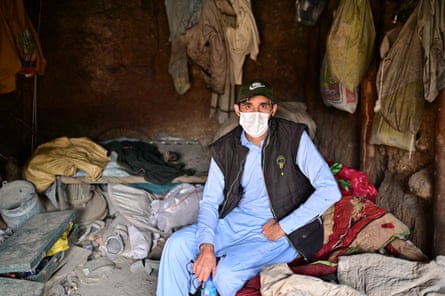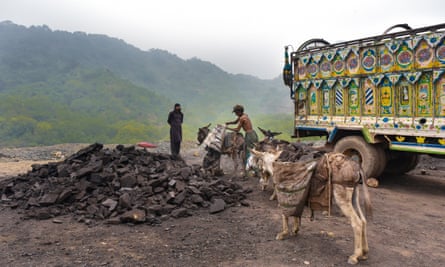Walking out of a mine shaft, “even the air seems strange”, says Tariq Irfan, who has worked in Pakistan’s coalmines since he was a teenager. The tunnels are less than six feet high in places, reinforced with planks of wood and canvas sacks. Dust swirls in the light from workers’ head torches, their only source of illumination.
They must stoop as they move through the mine to the end of the tunnel, where they repeatedly strike the wall ahead of them to break off pieces of coal. These are loaded into sacks on the backs of mules, who are driven back out into the sunshine to deposit the coal in heaped piles on the mountainside.
Working down the mine is “kind of a near death experience, because it’s so dark”, says Irfan, 43. “You feel blinded when you come out – it feels like there is life again.”
Coal mining runs in Irfan’s family – his father and grandfather were miners, although he wants something different for his children. Four years ago, he knew he was sick. He was coughing, short of breath, and losing weight. He felt anxious.

But seeing a doctor was not an option. Time off work would mean the loss of a day’s wages, even if he could persuade a supervisor he was genuinely ill.
Kinz Ul Eman, chief executive of non-governmental organisation the Dopasi Foundation, says even if miners do take time off work, there may be no nearby health clinics. Pakistan is a high burden TB country, with more than 600,000 cases annually, but cases are often in marginalised groups, hard for conventional health services to monitor.
“Even the dispensaries and the healthcare facilities that we visited in the mining setting, most of them were empty,” she says. “The facilities clearly seemed deserted. So we knew that there were no services whatsoever for the miners.”
So in 2019, Dopasi began a TB screening programme for miners using a grant from the Stop TB Partnership in which they bring the technology to the mines.
The foundation now runs mobile screening at a number of camps, directly outside the entrance to a shaft, with approximately 150,000 people seen to date. This has involved a lot of negotiation with mine owners and local officials, Ul Eman says, as many mines are not legally registered. But it means workers like Irfan can have a chest X-ray in the open air, interpreted using artificial intelligence for signs of TB. Advances in the technology will soon mean it can identify other lung conditions too, she says.

Miners are at high risk of tuberculosis. They spend hours each day down cramped mine shafts, and typically live away from their families, four or five to a small tent. Many develop silicosis, a lung disease caused by inhaling fine dust that scars the lungs and also raises the risk of TB.
But while they are now able to be screened without fear of losing a day’s wages, there is no such guarantee if they fall ill. Irfan agreed to the screening once he was reassured that Dopasi’s agreement with the mine owners meant he would not lose his job. However, he was unable to work for a month during treatment and wasn’t paid.
Irfan works near the town of Choa Saidan Shah in Pakistan’s Chakwal district. Each mine at the site produces 10 to 15 tonnes of coal a day, and the team of about 10 men are paid 2,300 rupees (approximately £6.50) a tonne, workers say.
after newsletter promotion

Most of the coal is destined for the region’s brick kilns, where workers earn only half as much – someone producing 1,000 bricks in a day will be paid 1,300 rupees. They also struggle to access healthcare.
Patrice Falaksher, in his 30s, is the breadwinner for his elderly parents, who live with him in a one-room hut provided by the brick kiln owners. He too was wary of seeking care despite debilitating symptoms.
“I was lethargic. I didn’t have the energy to work. I was coughing like anything and I had fever off and on,” he says. “My body was very weak.”
An eventual diagnosis of TB two years ago meant he could not work for months, and had to borrow money so he could travel to a clinic for treatment, and feed his relatives. The supervisors charge interest and Falaksher still owes about 100,000 rupees.
His wages are being docked while he pays it off, meaning he is tied to the kiln until the debt has been cleared.
The difference that falling ill and the resulting debt has made to his life is vast, he says. “It’s the difference between the earth and the sky.”
This reporting trip was paid for by the Stop TB Partnership, which is funded in part by the Bill and Melinda Gates Foundation, a philanthropic organisation that also contributes funding to support the editorially independent global development section at the Guardian